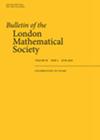在无限群上用Magnus属性
IF 0.9
3区 数学
Q2 MATHEMATICS
引用次数: 0
摘要
如果两个元素具有相同的法向闭包,则它们是共轭的或反共轭的,则一个群具有马格努斯性质(MP)。证明了无限MP群G$ G$是可解的,并且它的任何商都是MP。作为推论,我们得到了|G|$ |G|$的一个素数是2、3、5或7,并且得到了G$ G$的第二个导出子群是幂幂的。我们还证明了无限MP群的逆系统的逆极限也是MP。最后,当G$ G$是有限生成时,我们建立了G$ G$实际上必须是有限的。本文章由计算机程序翻译,如有差异,请以英文原文为准。



On profinite groups with the Magnus Property
A group is said to have the Magnus Property (MP) if whenever two elements have the same normal closure then they are conjugate or inverse-conjugate. We show that a profinite MP group is prosolvable and any quotient of it is again MP. As corollaries, we obtain that a prime divisor of is 2, 3, 5 or 7, and the second derived subgroup of is pronilpotent. We also show that the inverse limit of an inverse system of profinite MP groups is again MP. Finally when is finitely generated, we establish that must in fact be finite.
求助全文
通过发布文献求助,成功后即可免费获取论文全文。
去求助
来源期刊
CiteScore
1.90
自引率
0.00%
发文量
198
审稿时长
4-8 weeks
期刊介绍:
Published by Oxford University Press prior to January 2017: http://blms.oxfordjournals.org/

 求助内容:
求助内容: 应助结果提醒方式:
应助结果提醒方式:


